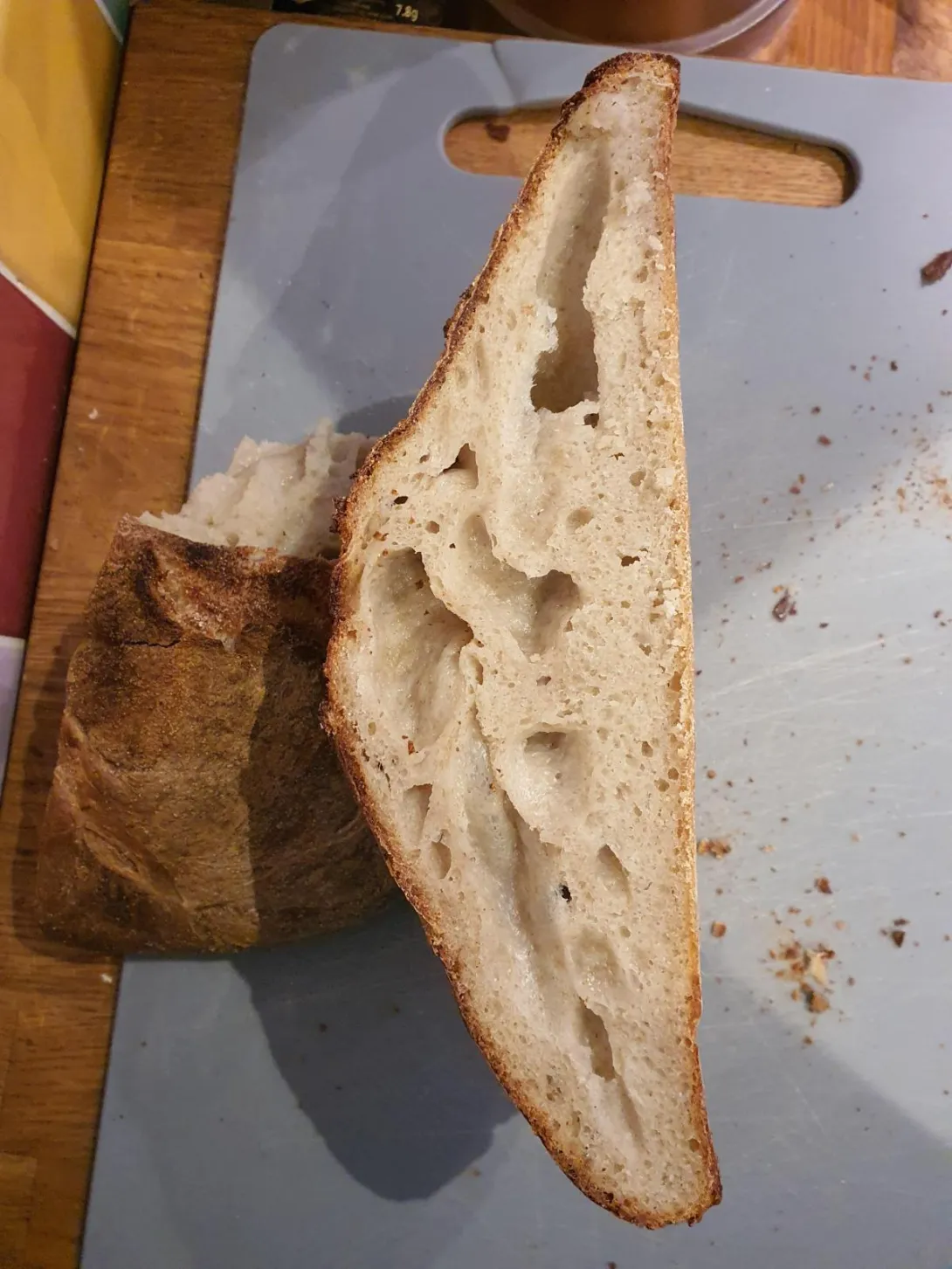
Hello!
I would like some input as to what might be going wrong with this loaf. Following the Overnight Country Blonde recipe from FWSY but overnight proofed in the fridge, after my last attempt turned out even worse than this (if you can believe that!). I have spent hours trying to find definitive answers and I'm totally lost in the weeds as to where exactly the problem lies.
100% hydration starter, mixed using the Rubaud method, 3 hours bulk ferment (I suspect this may not have been long enough) and then overnight in the fridge then straight into a preheated oven. Problems could also lie in the shaping as I am definitely a novice in this regard, and very confused about how to appropriately de-gas without destroying the dough!
Thanks for your time!
Dan
Dan, tell us everything you can about your starter. Please include temperature. Closeup images should be helpful.
You mention fermentation time, but in order to evaluate we need to know the temperature of the room during the fermentation.
Dan, the other one...
Sure thing! Starter is about 3 weeks old, fed twice daily with white bread flour (50g starter, 100g each flour & water). Current temperature of the starter is 70.9F, the ambient room temperature would have been around that at the time of baking.
Photos of Dwight attached!
Dwight looks great!
I don’t have your formula handy. Please let me know the ingredients and weights or percentages.
The three hours was not enough time. The recipe calls for an overnight room temperature bulk fermentation which happens to be too long in my experience. Try five hours and watch the dough. Pay attention to the desired dough temperature when mixing.
The overnight room temp bulk felt too long for me as well - I attributed the first failure to that and shortened the bulk accordingly. 3 hours was perhaps ambitiously short, driven by personal schedule rather than bread schedule. We'll see what happens with 5 hours next time!
If possible, don't use a set time to determine when dough is ready. Fermentation is influenced by a wide range of factors and as a result times will vary ( sometimes greatly!). After stretch and folds, leave the dough to bulk. A good place to start is leaving to rise 50%. If you have a clear tub with straight walls this is easier. If not do your best!
After pre shaping and shaping let it proof until it passes the poke test. Then bake!
Once you dial in your fermentation you can start playing around with some of the other techniques.
My loaves last night bulked in about two and a half hours. I've had some take seven or eight hours. However, every time when I've let the dough do its thing and waited until it was ready I've had great bread. When I try to get it to fit my schedule I'm usually a little or a lot disappointed.
Unfortunately I think it will be a long road of failures and lessons before I develop the intuition to know when a dough needs longer in the bulk. I have started a new loaf today following the same recipe and this time I'm going to pay more attention to the bulk ferment so that I can try to develop some understanding of good or bad. Fingers crossed!
Reading and determining end of bulk can be especially for newbies hard, I’ve recently been using an aliquot jar to assist in this decision. After you have mixed, added salt and done a first stretch and fold or coil fold or lamination whichever you use to start building structure, pull a 30 g ball of dough off and place it into a small jar and mark its level. From this small jar you can determine what volume increase your dough has made. I think for most sourdough we aim for 30-50% increase in volume, so when the aliquot jar dough has had that increase so has your main dough, you can then end bulk and move into pre-shaping or shaping.
Benny
I have done this for my current bread (same recipe, currently bulk fermenting). I am hopeful that it will guide me through the bulk!
The overnight country brown is a good bread but it will ferment even faster. You would have to live within the Arctic circle for that one to work. If you searched this site for Forkish over proof you will get a lot of hits. Sounds like you have the over and under bracketed so somewhere in between.